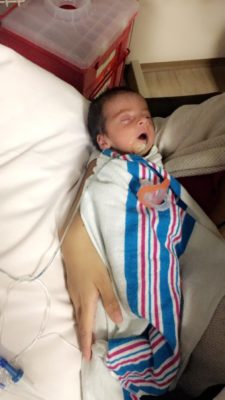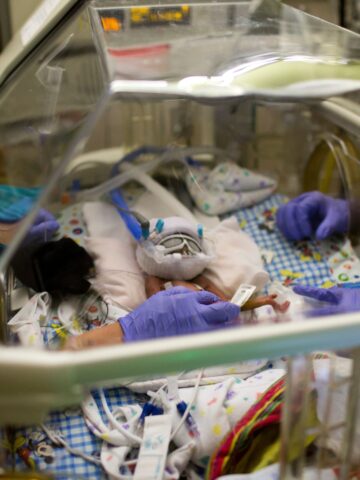Lizette Lough, experiencing a seemingly normal pregnancy, was making final preparations to welcome her first baby, when her water unexpectedly broke at 33 weeks. She was rushed to San Antonio Regional Hospital in Upland, close to home, where her son Landon was born early on May 3, 2016.
After a few days in the hospital, Lizette and her husband Sean noticed the baby had not made a bowel movement. Tests revealed that Landon had an obstruction in his intestine. His physician recommended Landon be transferred immediately to CHOC for an emergency surgery with Dr. Peter Yu, a pediatric general and thoracic surgeon.
“My husband and I lost it,” Lizette says. “Our baby was only three days old and weighed about 4 pounds. The thought of surgery was beyond frightening.”
Upon arrival at CHOC, the Loughs were immediately made to feel at home by the staff, who helped them find a nearby hotel. Dr. Yu explained every scenario of the complex surgery in a compassionate and confident manner, the Loughs recall.

“Landon was in stable condition when he arrived at CHOC, and I’m very pleased that our expert transport team was able to get him here quickly and safely. If there had been a delay in transfer, Landon could have become very sick and it’s very possible that more of his intestine could have died. If that would’ve happened, he may not have had enough bowel to adequately digest food, which can be incompatible with life,” Dr. Yu says.
Landon was diagnosed with jejunal atresia, a rare condition – approximately 1 in 5,000 births – in which the small intestine is incompletely developed, leading to one or more gaps, or blockages, in the intestinal tract.
Lizette had gone through the required genetic tests prior to Landon’s birth, and jejunal atresia – often diagnosed prenatally – was not detected.
Additionally, Landon had malrotation of his intestines, which failed to coil in the proper position in the abdomen. This led to twisting of his bowel. If surgery had been delayed for longer, Landon could have died.
Landon’s surgery involved making an incision on his abdomen, examining the entire length of his intestine and untwisting it, removing the dead bowel, stitching together his small intestine, and performing a Ladd’s procedure. A Ladd’s procedure places the intestines back into the abdomen in a safe configuration to prevent future twisting of the bowel.

Sean, who works as a law enforcement officer, recalls how traumatic this was for his family. “I’m used to working in stressful situations, but this was a different kind of stress,” he says. “We were so happy that our baby had a successful surgery and that he was better. However, we were still waiting for him to have his first bowel movement. We were trying to stay positive.”
After his first bowel movement indicated that his intestines were recovering well, and spending about a month in CHOC’s surgical NICU, Landon was finally able to go home with his family.
“It takes a team to successfully care for sick babies and complex patients,” Dr. Yu explains. “Landon would not have had the excellent outcome that he had without our wonderful neonatologists, experienced and skilled pediatric anesthesiologists, Melissa Powell, our dedicated surgical neonatal nurse practitioner, and the outstanding NICU nurses who have dedicated their lives to taking care of newborn babies such as Landon and countless others. Together, we have the only dedicated surgical NICU in the area, with a special focus on taking care of newborns with surgical problems.”

Thanks to the expert multidisciplinary care provided at CHOC, today Landon is a happy baby, meeting all his milestones. The Loughs are enjoying their brave little boy, and look forward to his first birthday next month.
“Dr. Yu, as well as the nurses in the NICU, were so empathetic and amazing. They saw us through so much throughout our stay and we will forever be thankful,” Lizette says.




